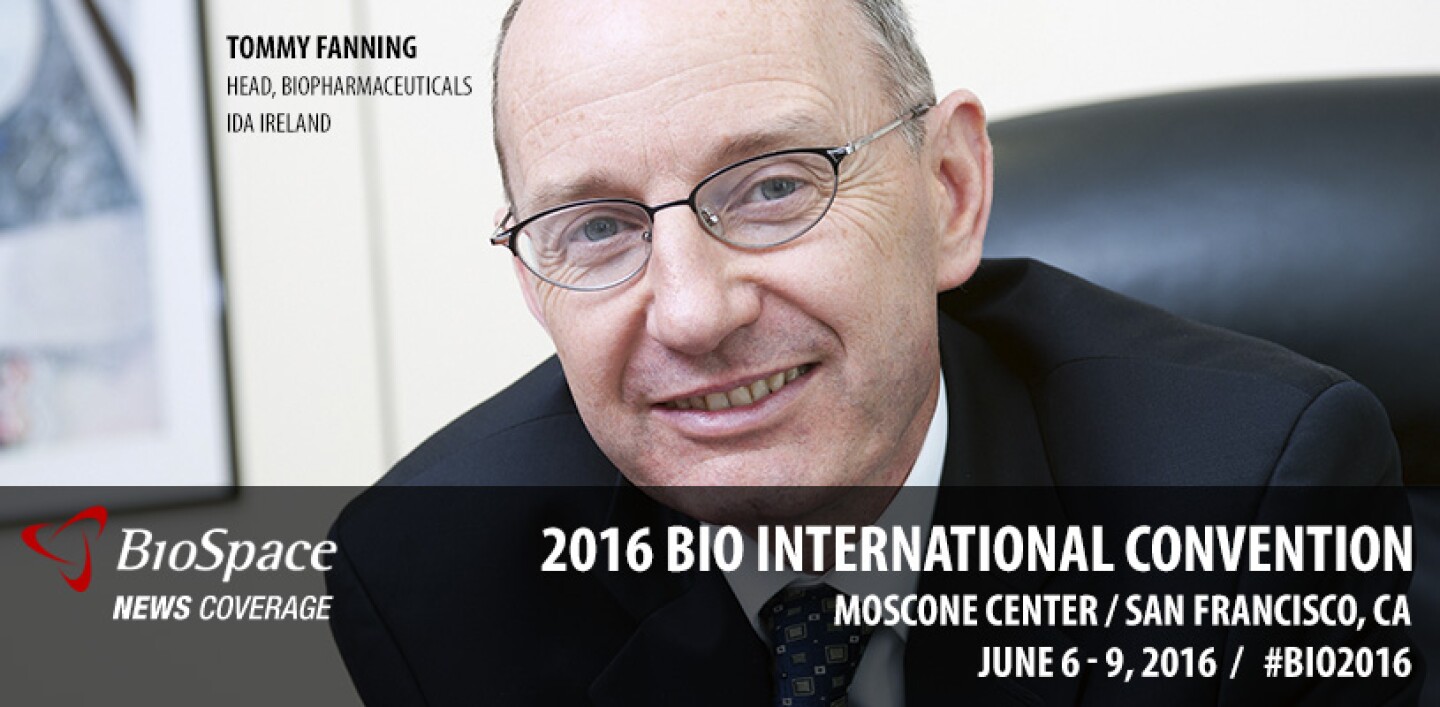June 9, 2016
By Alex Keown, BioSpace.com Breaking News Staff
SAN FRANCISCO – Ireland is more than the land of poets, cathedrals and fine whiskey, it’s also major hub of pharmaceutical and biotech manufacturing and development. It’s become a booming sector of that nation’s economy and the government of Ireland is looking to increase the industry’s presence in the Emerald Isle. That’s what brought Tommy Fanning, the Irish Government’s head of Biopharmaceuticals at IDA Ireland, in part to the BIO’s annual convention here.
Over the past 10 years, Ireland has drawn more than $10 billion dollars of capital investments and has become the largest net exporter of pharmaceuticals in the European Union. Last year, Ireland produced $44 billion in pharmaceutical exports. There are more than 75 pharmaceutical companies with some kind of presence in Ireland, and currently nine out of 10 of the world’s top pharmaceutical companies have established plants in Ireland, Fanning said, citing information on IDA Ireland’s website. The life sciences industry, including pharma, biotech and medical technology manufacturing, is no small player in Ireland, accounting for about 21 percent of that country’s economy.
“It’s a key demographic of our nation’s economy, with over half of our manufactured exports coming from the life sciences industry,” Fanning said.
During the BIO conference Fanning sat down with BioSpace to talk about what makes Ireland such an attractive place for pharmaceutical companies to either shift their headquarters to, or set up manufacturing facilities there. Fanning said he was spending his time at BIO listening to panel discussions and touting the strength of Ireland as a possible home for more life sciences companies.
“We definitely want to see more companies come to Ireland,” Fanning said.
While there is certainly pharma discovery being done in Ireland, Fanning said the strength of the industry there is in late-stage clinical research and the manufacturing end of things. There has also been a move from small molecule manufacturing to large molecule, Fanning said, highlighting companies such as Shire and GlaxoSmithKline that have set up shop in Ireland.
“We are at the leading edge of the biopharma economy,” Fanning said.
But, there’s more than just drug development. Fanning noted the trend of medical data analytics and next-generation medical services are gaining strong toeholds in Ireland. Fanning predicted the next wave of manufacturers to set up shop in Ireland will be those developing intelligent medical devices. He said companies like AbbVie and Sanofi Genzyme recently announced plans to set up manufacturing sites there.
Ireland has certainly been in the forefront of pharma news particularly after Pfizer called off its merger with Allergan after the U.S. Treasury Department changed its rules regulating inversion practices. Inversion is a method where American firms are acquired or merge with smaller foreign-owned corporations and relocate as part of an effort to reduce their U.S. tax burdens. Pfizer, based in New York, planned to become an Ireland-based company to take advantage of the business-friendly tax rate.
One reason, recently highlighted with the Pfizer deal, is Ireland’s corporate tax rate of 12.5 percent, which is far below that of the United States is 35 percent with an average of 4.1 percent added on top by the states. In addition to having a low corporate tax rate, Fanning said the Irish government has made it easy for companies to pay their taxes, which ends up being a cost effective measure.
Fanning said Ireland has always tried to be part of the international community and the government has strived to be a good civic citizen when it comes to being a home for business, Fanning said.
“Ireland has a strong business environment, which is something the Irish government has been working on for some time. We’ve also got the infrastructure to support these companies,” Fanning said.
One way Ireland has developed a strong infrastructure is through its educational system. The country’s university system has developed a strong track record of turning out students with the skills to support these companies. The university system has developed strong cooperative ties with the companies in order to support the advancement of biopharmaceutical research, Fanning said.
“We have created the environment to support a knowledge-based economy,” Fanning said. “We have the right jobs for the right graduates coming out of our universities.”
Another strength for Ireland is a strong compliance record with regulatory agencies such as the U.S. Food and Drug Administration (FDA) and the European Medicines Agency.
“If you look at the regulatory environment, we’re supplying drugs to all over the world, so we’re very familiar with those regulatory rules,” Fanning said.
One Irish investment that is paying dividends is the National Institute for Bioprocessing Research and Training (NIBRT), which provides immersive, hands-on training for biotech professionals on real-word equipment in a real-world environment. Fanning said nearly half of all life sciences employers in Ireland are using this facility and Thousand Oaks, Calif.-based Amgen actually sends many of its new hires to Ireland to train at the facility. “The success of this facility has been in the training it offers,” Fanning said.





